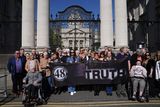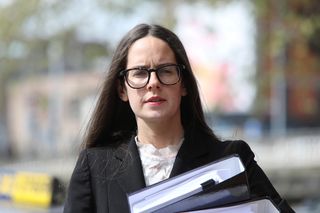The Yates anthology: Banking Inquiry is an omni-shambles


The banking inquiry is fast becoming an omni-shambles. This week's depressing displays did nothing to lift expectations. In any court forum or tribunal at least there's an opening gambit of accusation by lead prosecution counsel, setting out the book of evidence and charges. But in an inquiry we get an uncontested opening statement by former public servants and politicians, allowing them to self-proclaim their own absolution. We then endure a lamentable litany seeking to escape personal culpability.
The nadir came at lunchtime on Thursday, when RTÉ's most senior political correspondent described Brian Cowen's contribution as a "bravura performance - with aplomb".
I don't think the Leinster House/media bubble quite gets it. Lest anyone forgets: 330,000 lost their jobs; 40,000 businesses disappeared from the company register; 250,000 emigrated; property values on average halved; indigenous banks were insolvent; national debt leaped by a multiple of five - leaving an entire generation of taxpayers to repay €205 billion.
For some in sheltered sectors this was merely a temporary blip, others lost lives such was the mental anguish of financial ruin.
This inquiry is conducted with the total retro-benefits of several years' hindsight. There was a systems failure of regulation: unsustainable fiscal policies, and the catastrophic collapse resulting in the troika displacing our political class. This is not a matter of opinion, but historical fact.
As Charlie McCreevy and Brian Cowen came face to face with the consequences of their cumulative decisions, what did we get? To this observer it was akin to an encounter between the Pussycat Dolls versus Mike Tyson.
It was as if it was all a natural disaster, unavoidable and beyond political control. A token "sorry" with no sense of contrition.
The critical questions about relationships between Anglo Irish Bank contacts such as non-executive director Fintan Drury and Mr Cowen, remain unresolved.
Dinners and rounds of golf with Sean FitzPatrick apparently didn't involve any substantive discussions about that institution's hurtling descent towards destruction, requiring €34bn of taxpayer bailout.
A crucial element of Anglo's story was regulatory transparency and the taxation treatment of Contracts for Difference.
These CFDs allowed Sean Quinn to build up massive stakes as the largest shareholder in Anglo without anyone knowing it.
It got little or no mention at the committee.
The 2007 general election promises by all parties and the preceding budgets, epitomise the ultimate failure of our political system. The ultimate humiliation for voters is now to observe the architects of this cataclysm strut off into the sunset.
The best antidote is to vote for a party that will end current budget deficits.
Unfinished business
Women who worked in the Magdalene Laundries became eligible this week for free health care and other entitlements as part of the redress legislation stemming from a recommendation made in Justice John Quirke's report. Beyond ex-gratia payments between €10,000 and 100,000 (€18m to date), these elderly former victims are promised HSE medical cards and counselling services. Instead of bringing this matter to finality, there remains a significant injustice not only to these women, but also to the state and taxpayers.
No apology has been forthcoming from religious orders which ran the laundries. Various congregations failed to honour promised payments to the Exchequer. Only €81m has been paid into the Residential Institutions Statutory Fund, with €42m of property being transferred. This compares to total costs of the redress schemes of €1.45bn. Successive ministers for education and government have been half-hearted in ensuring the accepted principle of a 50-50 split would be implemented. It's time to step up legal sanctions of cost recovery. Moral persuasion hasn't and won't work. The four religious congregations involved are the Sisters of Mercy, Good Shepherd Sisters, Our Lady of Charity Sisters, and the Sisters of Our Lady of Charity of Refuge.
Given the restored property values, a fresh audit of their current assets is imperative.
These should be then sequestered into public ownership. No admission of wrongdoing or guilt is the final insult to these abused 900 women. Without this there's no closure for victims, irrespective of state help.
Uphill battles
It's fashionable to decry the world's greatest cycling event because of an endless sequence of doping scandals - some previous winners were competitors with the best and most elusive pharmacist. Today sees the start of 2015 Le Tour in Utrecht, Holland, culminating in Paris after 21 stages, covering a total distance of 3,360kms. Stages through the Alps and Pyrenees are unique in sporting television drama. Helicopter and motorcycle camera shots vividly relay the pain of the incredibly steep climbs, while time trials are ultimate in solo cycling.
It's the most open competition for years, but realistically only four competitors can win: Froome, Quintana, Contador and Nibali. My tip for yellow jersey victory is for Chris Froome (odds 9/4) to recapture 2013 glory, having overcome his last year's injury problems; his Sky team colleagues should have the strength to see him home.
Join the Irish Independent WhatsApp channel
Stay up to date with all the latest news
















